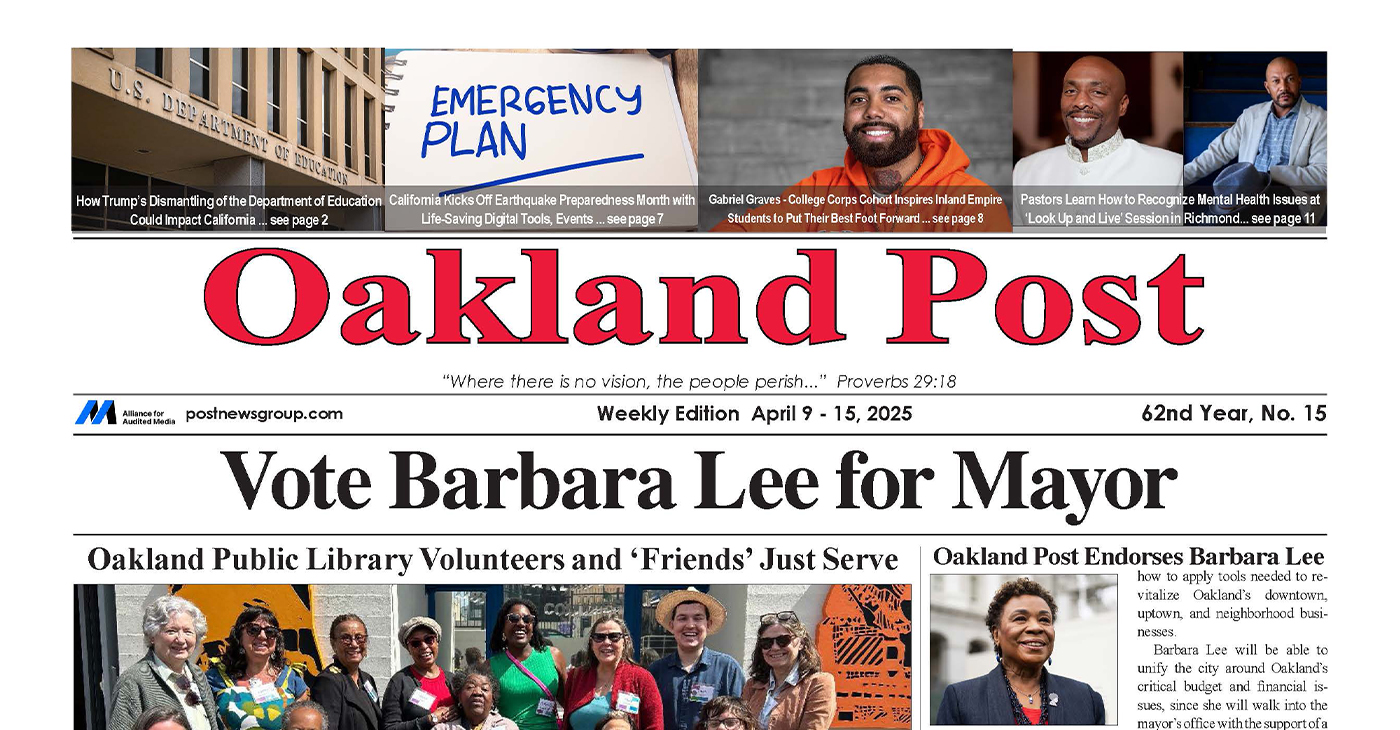Activism
COMMENTARY: DA Price Has Done Nothing Wrong; Oppose Her Recall
The job of the District Attorney’s Office is to do justice, not revenge. Since I was an NAACP leader and then a Congress of Racial Equality (CORE) Field Secretary in my home of Durham, N.C., in the 1960s, I have fought for prosecutorial justice of the kind Price tries to model. She is wrongly accused of not arresting criminals, (not her job), wrongly accused of letting criminal out of jail once arrested (not true) and failing to charge enhancements (part of a state reform movement).

By Walter Riley
Attorney at Law
It has long been known that the criminal justice system needs to be reformed. Pamela Price campaigned on a promise to reform Alameda County’s criminal justice system. She ran a grassroots campaign, largely funded by small donations.
Despite being outspent nearly 4 to 1, she won decisively with 53% of the vote. She took no money from police unions, freeing her to hold law enforcement accountable, something voters consistently identify as a major issue.
Recall organizing began before she even took office, showing that the recall is not about her performance.
The job of the District Attorney’s Office is to do justice, not revenge. Since I was an NAACP leader and then a Congress of Racial Equality (CORE) Field Secretary in my home of Durham, N.C., in the 1960s, I have fought for prosecutorial justice of the kind Price tries to model.
She is wrongly accused of not arresting criminals, (not her job), wrongly accused of letting criminals out of jail once arrested (not true) and failing to charge enhancements (part of a state reform movement).
Oaklandside reported. “In April 2020, a growing number of COVID-19 cases pushed the state court system to lower bail to $0 for most misdemeanor and lower-level felony offenses. The emergency bail schedule, the list setting bail at nothing for most types of crimes, was intended to help reduce the number of people being booked into county jail” during COVID.
It was the Judicial Council Order that released arrestees, not Price!
Sentencing reform makes all our communities safer. Price referred all her attorneys to guidance from the California Commission on Revision of the Penal Code, where charging and enhancements were addressed for reform at the state level.
California state law limits prosecution of youth as adults. Diversion typically yields better outcomes than arrest and prosecution in juvenile courts, including far lower likelihood of subsequent arrests.
Price’s directive to limit sentencing enhancements is a step toward creating a more just and fair system. Enhancements have disproportionately targeted marginalized communities, leading to excessive sentences without addressing the root causes of crime.
By limiting enhancements, Price is creating more balanced sentencing, focusing on rehabilitation over harsh punishment.
Her broader actions in office have shown a commitment to making Alameda County safer. According to California Gov. Gavin Newsom, crime in Oakland has dropped by 33% since DA Price took office, underscoring the effectiveness of her approach.
Her administration also expanded mental health courts, ensuring individuals with mental health challenges receive appropriate treatment, reducing recidivism.
In addition, she increased victim advocacy by 38%, providing support to over 22,500 victims.
The recall effort is premature and unjustified. DA Price has been in office for just over a year and a half, and despite significant opposition from the start, she has made transformative changes.
Some key achievements include:
- Holding corporations accountable has been a central pillar of her work, bringing in over $20 million in settlements and judgments, five times as much as previous administrations.
- Securing a $4 million settlement holding Safeway, Vons, and Albertsons accountable for overcharging customers,
- Filing 12 felony charges against a man accused of multiple armed robberies.
- Investigating and prosecuting police misconduct.
Her approach is focused on long-term reform, and residents deserve the chance to see these policies take full effect before casting judgment.
Media coverage has largely focused on sensational stories about crime, often overlooking the broader reforms and successes achieved by Price. Fear-driven narratives about crime spikes—many of which are linked to the pandemic—have often obscured her efforts to make the justice system fairer and more effective.
DA Price’s 40 years of experience as a civil rights attorney, including a win before the U.S. Supreme Court, has been foundational to her efforts to reform the criminal justice system.
Her deep understanding of justice, fairness, and accountability is precisely why she’s the right person to lead Alameda County’s justice system into the future. We can’t go back.
Activism
Oakland Post: Week of April 23 – 29, 2025
The printed Weekly Edition of the Oakland Post: Week of April 23 – 29, 2025

To enlarge your view of this issue, use the slider, magnifying glass icon or full page icon in the lower right corner of the browser window.
Activism
Oakland Post: Week of April 16 – 22, 2025
The printed Weekly Edition of the Oakland Post: Week of April 16 – 22, 2025

To enlarge your view of this issue, use the slider, magnifying glass icon or full page icon in the lower right corner of the browser window.
Activism
Oakland Post: Week of April 9 – 15, 2025
The printed Weekly Edition of the Oakland Post: Week of April 9 – 15, 2025

To enlarge your view of this issue, use the slider, magnifying glass icon or full page icon in the lower right corner of the browser window.
-

 Activism4 weeks ago
Activism4 weeks agoOakland Post Endorses Barbara Lee
-

 Activism4 weeks ago
Activism4 weeks agoOakland Post: Week of March 28 – April 1, 2025
-

 Activism3 weeks ago
Activism3 weeks agoOakland Post: Week of April 2 – 8, 2025
-

 #NNPA BlackPress3 weeks ago
#NNPA BlackPress3 weeks agoTrump Profits, Black America Pays the Price
-

 Activism2 weeks ago
Activism2 weeks agoOakland Post: Week of April 9 – 15, 2025
-

 #NNPA BlackPress3 weeks ago
#NNPA BlackPress3 weeks agoHarriet Tubman Scrubbed; DEI Dismantled
-

 #NNPA BlackPress3 weeks ago
#NNPA BlackPress3 weeks agoTrump Targets a Slavery Removal from the National Museum of African-American History and Culture
-

 #NNPA BlackPress3 weeks ago
#NNPA BlackPress3 weeks agoLawmakers Greenlight Reparations Study for Descendants of Enslaved Marylanders
























































